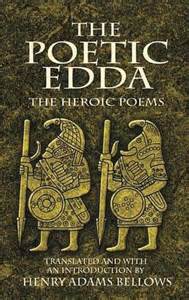See here.
When the Wanderer tells Ulrica and Alawin that all the Teurings who attacked Ermanaric's hall have been killed:
"Morning brought rain. Driven on a hooting wind, hail-cold, hail-hard, it hid everything but the thorp that huddled beneath it, as if the rest of the world had gone down in wreck." (Time Patrol, p. 456)
Nature weeps for the Teurings and the hard rain is like the end of the world. This pathetic fallacy works on the reader whether or not s/he recognizes it as such. I would not have been as conscious as I now am of literary devices the first time I read this story.
"'Ermanaric lives, but maimed and lamed, and poorer by two sons.'" (ibid.)
- and will fall within three years. He kills himself as both a storm and the Huns approach. Anderson seems to be unable to stop writing pathetic fallacies...
Anderson has to let Ermanaric win the fight but does not let him benefit or profit from it. Alawin must lead the remnant of the family to join the West Goths, burning Heorot behind him. It will not be remembered that that famous name was used here as well - or Carl would not have used it. The West Goths move to south Gaul and Alawin's descendants help to found the Spanish nation. I saw recently on television that the Arian West Goths who moved to Spain found themselves surrounded by Catholics and therefore adapted to Catholicism. I had wondered what became of the Gothic Arianism.

4 comments:
Kaor, Paul!
A very serious source of weakness for the Arian Gothic and Vandal kingdoms in Italy, Spain, and northern Africa after the Western Empire fell was the resentment many of the Catholics in these regions had at being ruled by barbarian Arian heretics. Compounded at times by Arian persecution of the Catholics. Eventually the Ostrgoths of Italy and the Vandals in North Africa were reconquered by the Eastern Empire Justinian (and a large part of Visigothic Hispania as well).
Far too briefly, Arianism is the doctrine teaching that Jesus Christ is not truly the Son of God, not truly the Second Person of the Trinity. Iow, a denial of the divinity of Christ. And Arianism still exists today among those who deny the divnity of Jesus Christ.
Sean
Sean,
Thank you for the history.
Paul.
Kaor, Paul!
J.B. Bury's two volume HISTORY OF THE LATER ROMAN EMPIRE FROM THE DEATH OF THEODOSIUS I TO THE DEATH OF JUSTINIAN is a good narrative history of the period.
Sean
What did you think of Sprague De Camp's, portrayal of the 'persecution' of Catholics by the Ostrogoths as being simply the Ostrogoths declining to let the Catholics persecute anyone else ;)
Post a Comment